题目内容
Twelve-year-old Leonardo was born in a poor family in Bambamarca in Peru. He knew how to read but he had never seen a book in his life. So he asked the new priest(牧师)in his village to give him one. But there was no electricity. So Leonardo borrowed candles from the church and sat up all night reading it. The next morning, he was at the door of the priest asking for another book to read.
John Medcalf, the priest,was moved. He also realised that people would love to read if given a chance. But he knew how difficult it was for Leonardo and those in his village to get books. And yet, no one can be taught to read and write without books. To make people in a poor, faraway area grow to love books,they have to be with them. So he thought the only way was to bring books to people.
But how could this be done? Mobile libraries or car libraries would be too expensive and difficult to continue in the rocky, hilly land of Peru. So what other methods could be used?
Medcalf got a new idea from the barefoot(赤脚)doctors of China. And that was how the barefoot librarians(图书管理员)first appeared in the villages of northern Peru,almost thirty years ago.
The librarians began by going from village to village, lending books to villagers. They helped start The Rura1 Library Network of Peru.
At first,they were teachers of the village schools which these faraway libraries belonged to. But the teachers were not very interested in the job because it meant a lot of hard work. So, village leaders took on the job themselves.
Today, there are 600 village libraries across Peru. The barefoot librarians who walk up to 15 hours a day with bags of books are their lifeline.
1.The first paragraph tells us that Leonardo ______ .
A. had a lot of books
B. bought candles from others
C. enjoyed reading books
D. lived in the church
2.The underlined word "this" in Paragraph 3 probably refers to “______ ”
A. to grow to love books B. to bring books to people
C. to read and write D. to build a new library
3.The passage doesn't mention ______.
A. when the barefoot librarians appeared
B. who worked as village librarians at first
C. where Medcalf met Chinese doctors
D. how many village libraries Peru has today
4.It can be inferred(推断)from the passage that ______.
A. the first church in Peru was set up by John Medcalf
B. car libraries used to be popular in Leonardo's village
C. teachers were interested in bringing books to villagers
D. the barefoot librarians are important to village libraries

